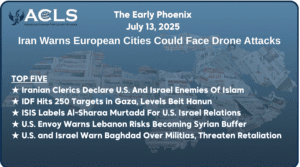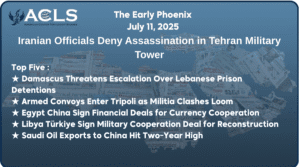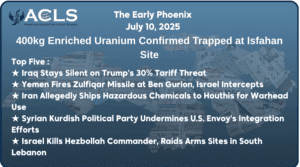TOP HEADLINES:
- Khamenei’s Iraq Visit Strengthens Iran’s Influence
- Turkiye Expands Economic Ties with Global Partners
- PA Sets Terms for Saudi-Israel Talks, West Bank Outposts Legalized
- SDF Pursues Dialogue, U.S. Engages, Turkiye Concerned in Syria
- Suspected Iranian Spy Escapes UK Prison
Currencies:
1 US Dollar = 14,100 SYP
1 US Dollar = 49,750 IRR
1 US Dollar = 1,308 IQD
1 US Dollar = 30 EGP
1 US Dollar = 27 TL
SYRIA
- SDF Seeks Dialogue, U.S. Engages, Turkiye Concerned in Syria’s Northeast (Syria TV, Rohani TV, Orient, Jeser Press, SHOR). In a volatile regional landscape, multiple actors are shaping the unfolding dynamics in Syria. SDF Commander Mazloum Abdi is pushing for dialogue with Arab tribes in Deir Ezzor and blaming the Assad regime for inciting unrest. He has pledged to address Arab clans’ concerns and rectify governance issues. Concurrently, U.S. forces have increased local engagement in Deir Ezzor to assess security and humanitarian conditions. Turkish forces are escalating attacks against the SDF in Al-Raqqa Governorate, prompting power outages in several villages. Turkiye’s Foreign Minister Hakan Fidan criticized U.S. support for the SDF and called for an end to what he views as oppressive policies against Arabs. Reports have also emerged that the SDF established a drone-manufacturing base in Al-Hasakah. Meanwhile, an Assad regime officer, Mahidi Aqab Al-Abdullah, has been seen fighting alongside local militants against the SDF. Violence in “Self-Administration” areas has surged, with 185 reported dead and injured in August.
- Protests in As-Suwayda Continue for 19th Day; Mass Demonstration Planned (Syria TV). For the 19th consecutive day, protesters in As-Suwayda’s Al-Karama Square call for the ousting of the Syrian regime and President Bashar al-Assad. A major demonstration is planned for Friday, following the largest protest since 2011 in Salkhad. The prolonged, expanding protests pose a unique challenge to the regime.
- Assad’s Regime Rejects Concessions as Saudi Arabia and Arab Nations Pause Diplomatic Ties (Syria TV). Assad’s Foreign Minister, Faisal al-Miqdad, spoke at the Arab League Council, stating that Syria won’t make political concessions to receive support for recovery projects. He asked for aid without strings attached and rallied against Turkish involvement in Syria. On the other hand, Saudi Arabia is calling for foreign troops to leave Syria and has slowed down its diplomatic re-engagement with the Assad regime, partially due to U.S. concerns over financial aid to Syria. U.S. Ambassador Robert Wood condemns the Assad regime for violating the Chemical Weapons Convention and UN resolutions. He cites nine confirmed chemical attacks and criticizes Russia for shielding Syria from UN accountability. Wood reaffirms the U.S.’s commitment to justice for victims and holding Syrian officials accountable.
- Jordan Refuses New Refugees Amid Protests; Ex-Minister Slams Assad’s Neglect on Refugee Crisis (Aleppo TV, Orient). Jordan’s Foreign Minister Ayman Safadi announced the country can’t accept more Syrian refugees, citing a lack of international aid and the need for a political solution. His remarks are amplified by former Minister Samih al-Maaytah, who criticized Assad for his neglect of the refugee crisis affecting Jordan and the broader region. Despite joint committees and coordination with the UN, Assad shows little interest in facilitating the return of refugees or addressing the issues they face, such as lack of infrastructure and forced military service. These developments occur against a backdrop of ongoing protests in As-Suwayda and dwindling international support for Syrian refugees.
- Hezbollah Receives Arms Shipment Near Damascus (Aleppo TV). A convoy from Lebanon delivered a cache of weapons, including advanced firearms and surveillance gear, to Hezbollah in the Sargaya region near Damascus. Received by Hezbollah leader “Hajj Munif,” the shipment prompted increased security measures in the area. The Israeli air force has previously targeted such deliveries.
IRAQ
- Khamenei’s Appearance in Iraq’s Karbala’s Pilgrimage Solidifies Iran’s Deepening Influence (Tehran Times,Al-Ahed News, Al Hadath). In a significant development, Ayatollah Khamenei attended the Arbaeen pilgrimage in Karbala, emphasizing the role of the younger generation in carrying forth his message. His presence further underscores Iran’s growing influence in Iraq, as highlighted by the unprecedented turnout of 22 million participants, including 4 million Iranians, at the pilgrimage. Brigadier General Radan of Iran’s Internal Security Forces and Iraq’s national security advisor, Qasim Al-Araji, confirmed high-level cooperation efforts between the two countries. The pilgrimage, which has evolved with new political undertones since 2017, serves as a platform for resistance pledges against Western powers and calls for Islamic unity.
ISRAEL & PALESTINIAN TERRITORIES
- Israel Faces Economic Downturn Amid Judicial Crisis (Times Of Israel). Israel’s economy is facing a series of challenges, as foreign direct investment plunged 34% to $2.6 billion in Q1 2023, compared to quarterly averages in 2020 and 2022. The volume of “exit” transactions, such as mergers and acquisitions, also saw an 80% decline to $56 million during the same period. Finance Minister Bezalel Smotrich stated that although Israel’s economy is relatively robust on a global scale, inflation remains a concern. Adding to the economic uncertainty, the shekel recently hit its lowest value since March 2020, falling to 3.84 against a strengthening dollar, amid growing concerns over proposed judicial reforms and their potential impact on democracy and investment.
- PA Sets Terms for Saudi-Israel Talks as Israel Legalizes West Bank Outposts (New Arab, Times of Israel, BBC). The Palestinian Authority (PA) has stipulated conditions for its participation in Saudi-Israel normalization talks, demanding governance over certain West Bank areas and a halt to Israeli settlements. Concurrently, Israel has legalized three West Bank outposts, a move that satisfies far-right elements but is contentious internationally. Both developments come amid domestic pressures: U.S. President Biden seeks gains for the Palestinians to appease his party, while Saudi Crown Prince Mohammed bin Salman must consider public sentiment against Israel.
EGYPT & NORTH AFRICA
- U.S. Sanctions and Al-Burhan’s Diplomacy Reshape Sudan Conflict (Al Jazeera, France 24). The U.S. sanctions targeting Sudan’s Rapid Support Forces (RSF) are believed to weaken their economic capabilities, including arming their forces. The Sovereign Council’s recent decision to dissolve the RSF constitutionally is seen as a move to protect the group’s assets from these sanctions. Meanwhile, Sudanese army commander Lt. Gen. Abdel Fattah Al-Burhan recently visited Doha, his third international trip aimed at securing international legitimacy since conflicts with the RSF began.
- Egypt Sells Stake in State-Run Tobacco Firm Amid Currency Crisis (New Arab). Facing a foreign currency shortage amid an economic crisis, Egypt has sold a 30% stake in the state-run Eastern Company, a tobacco giant, to UAE-based Global Investment Holding for $625 million. The deal comes after a local scarcity crisis caused cigarette prices to nearly double. The Emirati company will also invest an additional $150 million for raw materials in tobacco manufacturing.
TURKIYE
- Turkiye Bolsters Economic Ties with US, EU, and World Bank (Anadolu Agency, Daily Sabah). Turkiye is making strategic moves to bolster its economy and international relations. Mehmet Ali Yalcindag, chairman of the Turkiye-US Business Council, announced a new era of trade relations with the US, citing a 54% increase in trade volume over the past three years and targeting a $100 billion trade volume. The European Union and Turkiye have signed a project to support the social integration of foreigners, highlighting Turkiye’s role in global migration. Meanwhile, the World Bank is preparing an $18 billion support program for Turkiye, praising its efforts to stabilize the economy. These partnerships come amid ongoing economic reforms and are viewed as a comprehensive effort to strengthen Turkiye’s economic and social fabric.
- Istanbul Mayor Under Fire for Failing to Prevent Deadly Floods (Al Jazeera, Al Hadath, Anadolu Agency). Heavy rains in northwestern Turkiye led to floods that killed at least 7 people and injured 31 others. The mayor of Istanbul, Akram Imamoglu, has come under criticism for not adequately preparing for the floods despite having spent billions of Turkish liras on flood prevention projects. Critics point out that the city had previously claimed to have solved the problems of torrents and floods. Imamoglu defended his actions, stating that the heavy rainfall was surprising and that preparations are being made for more extreme weather events due to climate change.
GULF REGION & YEMEN
- GCC Urges Iraq to Acknowledge Saudi-Kuwaiti Ownership of Al-Durra (Azzaman). The Council has called on Iraq to finalize the demarcation of its maritime borders with Kuwait and affirmed that the Al-Durra field and adjacent submerged areas are solely the joint property of Saudi Arabia and Kuwait. The Council categorically rejects any claims to these resources by other parties.
IRAN
- Iranian Opposition Rallies: Exiled Prince and Israeli Minister Seek Regime Change (Iran International). Iran’s exiled Prince Reza Pahlavi and Israeli Intelligence Minister Gila Gamliel are both rallying for unity among Iranians opposed to the current regime. Pahlavi called for national protests to topple the Iranian government on the anniversary of Mahsa Amini’s death in custody. He specifically addressed various groups suffering under the regime and warned the Islamic Republic leaders against any violence towards protestors. Gamliel, who recently met Iranian journalists and activists in London, emphasized the need to sanction Iran’s Revolutionary Guard Corps (IRGC) and support the Iranian people. She also urged Western leaders to impose sanctions on Iran and the IRGC, emphasizing that the issue is a global concern. Both figures have met in the past, signifying a growing alliance against the Iranian regime.
- Suspected Iranian Spy Escapes UK Prison: Heightened Security at Ports and Airports (Middle East Eye). Daniel Khalife, a man suspected of spying for Iran, escaped from Wandsworth prison in the UK. Khalife was facing charges of collecting information useful to an enemy, believed to be Iran, among other terror-related offenses. He was last seen in a chef’s uniform, having worked in the prison kitchen, and is thought to have escaped by clinging to a delivery van. Although authorities have put ports and airports on high alert, they believe he is still in the London area and do not consider him a threat to the wider public. Khalife had also faced charges for planting a hoax bomb at a Royal Air Force base earlier this year. Iran has not commented on the allegations.
- U.S. Court Unseals Case of Seized Iranian Tanker Suez Rajan Following Advocacy Group’s Report (Iran International). Documents unsealed in a U.S. court revealed that the tanker Suez Rajan was seized by the U.S. government, marking the first time U.S. prosecutors acknowledged the confiscation of around one million barrels of Iranian crude. The case came to light in February when the advocacy group United Against a Nuclear Iran reported the tanker’s role in illicitly transferring Iranian oil in the South China Sea. The vessel was stranded off Singapore’s coast for months before sailing to the Gulf of Mexico, suggesting a U.S. seizure of the oil.
LEBANON
- Massive Palestinian Displacement Amid Heavy Clashes in Ain-al Hilweh Camp (Al Hurra). Renewed clashes near Sidon come after the Palestinian Joint Action Authority deployed a security force to apprehend suspects in a late July assassination. The unrest broke a month-long calm and involves gunmen armed with automatic weapons. The camp was established in 1948 and holds over 50,000 registered refugees.
- Lebanon Renews Iraqi Oil Supply Deal Amid Crisis (24). Lebanon’s Cabinet has approved the renewal of an agreement with Iraq to receive an additional 1.5 million metric tons of black oil. Initiated in 2021, the deal helps Lebanon fuel its power plants in exchange for medical goods and services. The approval comes as Lebanon grapples with severe economic and political instability.
- Israeli Chief of Staff Inspects Borders for Hezbollah Escalation (Press Bee). General Herzi Halevi, the Chief of Staff of the Israeli Army, conducted a border inspection amid concerns of potential escalation with Hezbollah. The inspection coincides with internal debates over military conscription laws in Israel.
- Lebanon Blocks Syrian Entry as PM Warns of Threat to National Stability (Al Ghad, North Press). Lebanon’s army blocked 1,200 Syrians from entering this week, amid Prime Minister Najib Mikati’s warning that the rising influx of mainly young Syrian refugees threatens national stability. A security meeting is slated for next week as Lebanon grapples with its own crises and an estimated refugee population up to 2 million.



